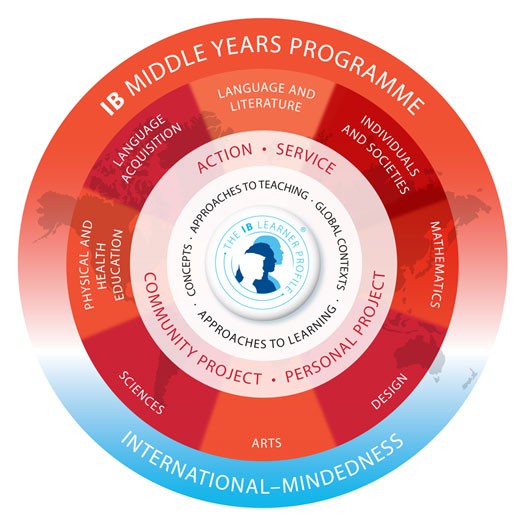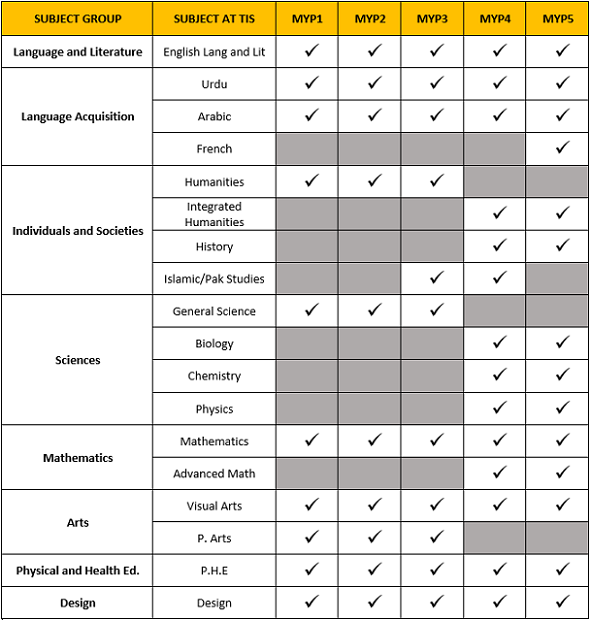The MYP at TIS is:
- For students aged 11 to 16
- a frameworks of academic challenge
- 8 subject groups, plus interdisciplinary learning in years 1-3
- 6 subject groups, plus interdisciplinary learning and the personal project in years 4-5
- Taught in English
The MYP encourages students to:
- Understand the connections between subjects through interdisciplinary learning
- Understand the connections between subjects and the real world
- become critical and reflective thinkers
MYP Model:

Learner Profile
The attributes of the Learner Profile express the values inherent to the IB continuum of international education.
IB programmes promote the education of the whole person, emphasising intellectual, personal, emotional and social growth through all domains of knowledge.
Why the Middle Years programme?
Parents who want the best possible education for their children choose the MYP because it includes:
- Rigourous learning objectives
- A student-centred approach to teaching
- International perspectives
- Concern for the whole child
- Sustained teaching and learning in more than one language
- A focus on learning how to learn
- The development of flexible thinking that prepares students to evaluate information critically and apply knowledge in complex, unfamiliar situations.
The MYP teaches tools for lifelong learning and fosters responsible attitudes that help students discover how to use what they learn to take principled action. The MYP’s focus on independent learning makes it the ideal preparation for the IB Diploma Programme (DP) and the IB Career-related Certificate (IBCC).
MYP Subject Groups
All courses or subjects are grouped in the following 8 disciplines:
Language and Literature:
The school’s language of instruction, English
Language Acquisition:
Urdu, Arabic, French
Individuals and Societies:
History, Integrated Humanities
Sciences:
Biology, Chemistry, Physics.
Mathematics:
Course including the five branches of mathematics: number, algebra, geometry and trigonometry, probability and statistics, and discrete mathematics.
Arts:
Visual Arts and Performing Arts.
Physical and Health Education:
Course includes health and fitness, individual and team sports.
Design:
Digital and product design

Distinctive features of the MYP
In the MYP, students study 8 subject groups, with a minimum of 50 teaching hours per subject group each year. Distinctive features of the MYP include:
Key and related concepts are big ideas, which form the basis of teaching and learning in the MYP. They ensure breadth and depth in the curriculum and promote learning within and across traditional.
Global contexts provide shared starting points for enquiry into what it means to be internationally minded, framing a curriculum that promotes multi-lingualism, intercultural understanding and global.
Approaches to teaching and learning, a unifying thread throughout all MYP subject groups, are skills which help students manage their own learning. They provide a foundation for success in further education and the world beyond the classroom.
Interdisciplinary learning in the MYP, is the process by which students come to understand bodies of knowledge and ways of knowing from two or more disciplines or subject groups and integrate them to create new understanding.
Action and service , essential components of the MYP, set out clear learning outcomes that grow from students’ participation in local and global communities. MYP projects are informed by respected models of service learning and provide stepping stones toward the Diploma Programme’s core requirements for Creativity, Activity and Service (CAS).
Service in the MYP is not measured quantitatively, but qualitatively, by fulfilling certain learning outcomes. These following outcomes are the focal points for students while writing reflections about an act of service:
LO1: Become more aware of their own strengths and areas of growth
LO2: Undertake challenges that develop new skills
LO3: Discuss, evaluate and plan student-initiated activities
LO4: Persevere in action
LO5: Work collaboratively with others
LO6: Develop international-mindedness through global engagement, multilingualism and intercultural understanding
LO7: Consider the ethical implications of their actions
The personal project, for students completing the programme in year 5 is a culminating experience, in which students apply their approaches to learning skills to complete an extended, self-directed piece of work. This required component provides opportunities for creative and truly personal demonstrations of learning.

